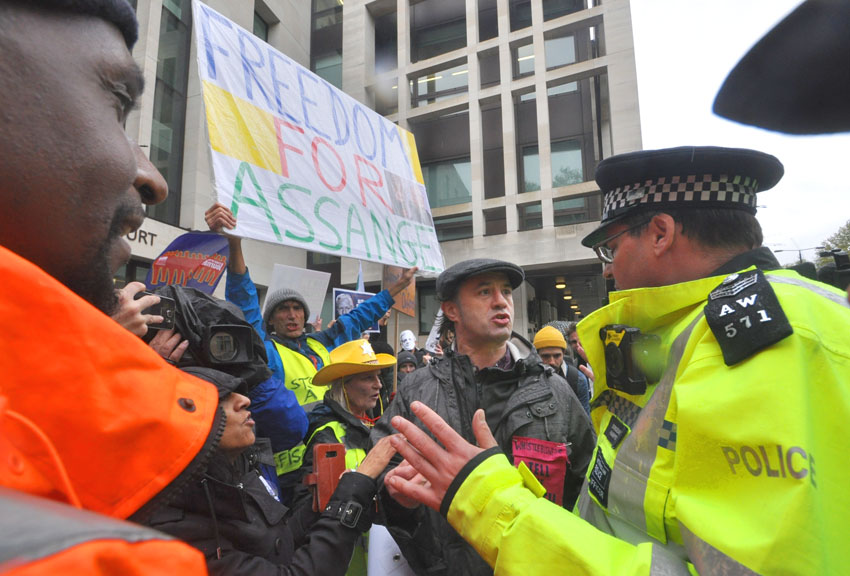This 3 July 2020 video from California in the USA is called More Than 1,100 Inmates Infected With COVID-19 At San Quentin Prison.
7 prisoners with coronavirus died at San Quentin and hundreds more are dying in US jails and prisons
July 10, 2020
Governor Gavin Newsom [of California] is facing mounting pressure to release inmates as corrections officials scramble to contain outbreaks of coronavirus at state prisons.
The outbreak at San Quentin State Prison, where more than half of the Covid-19 cases in state prisons have been reported, has claimed the lives of at least seven incarcerated people, according to a tally from the California Department of Corrections and Rehabilitation.
“It is incredibly frustrating that we had one person make the decision to transfer a few patients from one prison, Chino, into San Quentin,” Newsom said Thursday in a news conference. “That decision created a chain of events that we are now addressing and dealing with. I’m not here to sugarcoat that.”
The prison had escaped the early months of the pandemic unscathed until cases began soaring in late May after a transfer of detainees from the California Institution for Men in Chino.
Several advocates and lawmakers gathered outside San Quentin on Thursday, calling for the release of medically vulnerable and older detainees. California has not had an execution since 2006, yet six people from my understanding in the past few weeks have been executed by Covid while on death row,” said Adnan Khan, executive director for Re:Store Justice, a criminal justice reform advocacy group.
Authorities in California have been releasing prisoners who are close to finishing their sentences since March due to the pandemic. In San Quentin, more than 500 detainees have been released due to both expedited and natural releases, the CDCR has said.
Inside prison and jails, the pandemic couldn’t feel more palpable as detainees were forced to live, work and eat in close quarters.
Correctional facilities across the country have become major hotspots for the virus in the past months and San Quentin is just the latest.
Nearly 100 people have died in Texas facilities
Before the outbreak at San Quentin, the virus ravaged correctional facilities in central Ohio, Illlinois, Colorado and Texas, where at least 91 incarcerated people and nine staff members with Covid-19 have died, according to state’s department of criminal justice.
Corrections officials are still trying to determine whether 26 additional deaths are linked to the virus.
About 130,000 people are incarcerated across Texas facilities and more than 10,500 detainees have or have had Covid-19. At least 1,927 staff members have also tested positive for the virus, according to the Texas Department of Criminal Justice.
Unlike California and other states, Texas officials have not moved to release parole-eligible detainees or those who are near the end of their sentences in an effort to reduce the population and slow the spread of the virus, despite calls from advocates and family members.
Gov. Greg Abbott signed an executive order in March to prevent the release of “dangerous criminals” from correctional facilities.
“We want to prevent the spread of #COVID19 among prison staff & inmates. But, releasing dangerous criminals in the streets is not the solution,” the governor tweeted at the time.
Last month, the American Civil Liberties Union released a report saying that more than 570 incarcerated people and over 50 correctional staff have died.
The ACLU analyzed the states’ response to Covid-19 in jails and prisons and found that many states have taken very little action to “implement a cohesive, system-wide response to protect and save lives” amid the pandemic.
Coronavirus infections are more than 5 times higher in prisons
A study released earlier this week showed that the number of incarcerated people infected with Covid-19 and the coronavirus-related death rate in federal and state prisons is higher than the overall US population.
Coronavirus deaths and infection rates higher in US prisons than general population, analysis finds
“The number of US prison residents who tested positive for Covid-19 was 5.5 times higher than the general US population,” said an analysis led by researchers at Johns Hopkins Bloomberg School of Public Health.
Researchers said the disparity could be worse because mass testing in some prisons revealed wide Covid-19 outbreaks “with infection rates exceeding 65%” but many facilities are not testing inmates or only test symptomatic people.
The study analyzed cases and deaths from March 31 to June 6 using publicly available data from corrections departments websites, news reports and other sources. As of June 6, there were more than 42,100 cases of Covid-19 and 510 virus-related deaths among the nearly 1.3 million incarcerated people, researchers said.
‘They have given us flimsy paper masks,’ detainee says
Families and advocates have been calling for better conditions at the Prince George’s County jail in Maryland and now actors Jesse Williams and Alec Baldwin, singer Fiona Apple and several Broadway actors have joined them.
“We’re locked down for twenty-three hours or more per day in our hot cells. I get one hour to shower, use the phone, and clean my cell. There’s no social distancing on the phones,” said Baldwin in a video as he read a statement from a 39-year-old detainee.
The video is one of several messages recorded by celebrities, attorneys and activists for “Gasping for Justice”. An initiative by the impact advocacy project Hear Us to share first-hand accounts from detainees.
The statements were part of a federal lawsuit filed in March on behalf of detainees, describing unsanitary and crowded conditions at the Prince George’s jail.
“I don’t think it’s clean enough in here, and we are not getting enough cleaning supplies. I try to keep my cell clean, but they don’t let us use bleach. I ask for spray-nine and the guards say no. I use a rag and my hands. When I find a way to sneak some spray-nine, I use that too,” another detainee said in a statement, read by Broadway’s “Jagged Little Pill” actor Sean Allan Krill.
:format(jpeg):mode_rgb():quality(90)/discogs-images/R-3017589-1311912894.jpeg.jpg)

